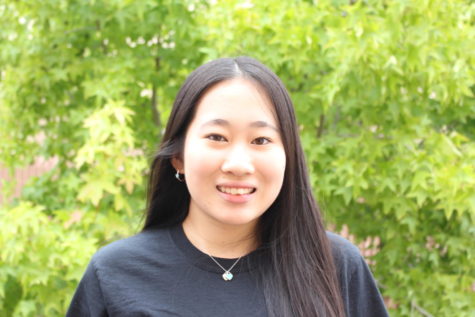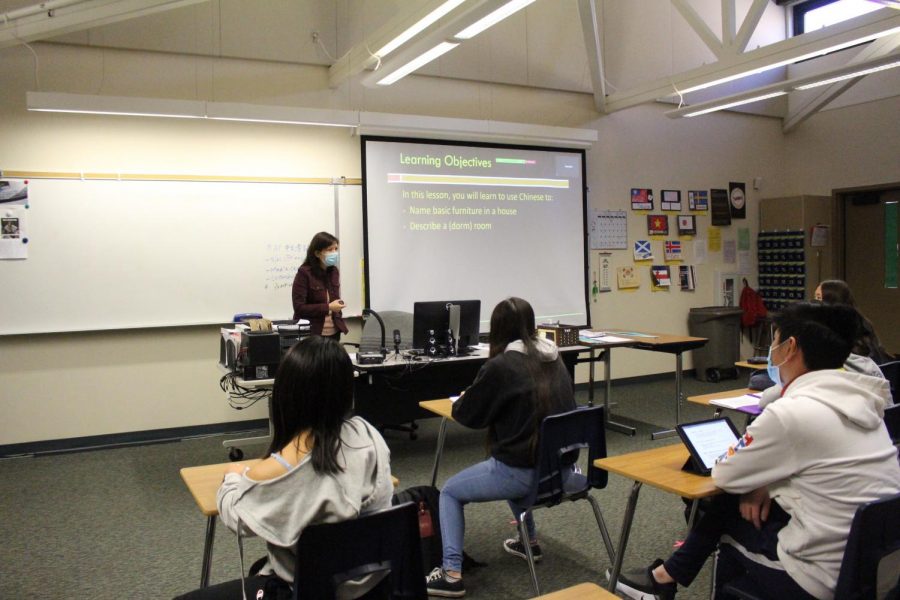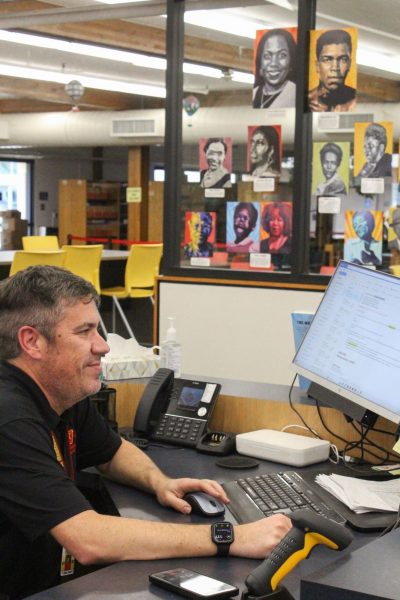Warriors Stay Engaged in Foreign Language Classes From a Distance
The world language department and students stay positive during an unprecedented year through an adjusted curriculum
Chinese teacher Joy Chao teaches a hybrid class using learning objectives
In a hectic year where everything seems to be unprecedented and full of surprises, staff and students have had to learn how to adjust to stay engaged and on track. Foreign language is one of the classes that has suffered the most from the effects of the pandemic.
Chinese teacher Joy Chao has found that getting her students to talk as much as years prior has been the biggest challenge. The factor of only seeing each teacher once in-person per week has added to the challenge. Chao tries to focus on the essential units this year and highlights going more in-depth with them. Chao’s students study vocabulary and grammar online outside of class time and come into class each week with questions to save time.
“With communicative language[s] such as Chinese, the learners do get better from speaking, just like a child learn[s] a language naturally by oral communication, not pencil and paper. I have students share with me that without seeing mine and others’ faces, especially in a world language classroom where facial expression and body language assist in expression tremendously, it’s harder for them, especially the lower levels, to get the meaning of the words correct because of it,” Chao said.
This is exacerbated when teachers have more than 120 students. Teachers can spot who is struggling in their class, but it is almost impossible to know where they need help, so Chao urges students to reach out to their teachers if they find themselves struggling this year.
“I always tell my students to focus on what the teacher is doing so you don’t need to waste more time trying to play catch-up afterwards; that’s even more time-consuming and one usually ends up with late work or bad grades on tests. Not worth it. I rather save the time for more zzzzzz…” Chao said.
Junior and Chinese student Lena Fukuzawa says that wearing masks has proved a huge obstacle for students to be able to maximize speaking skills. Fukuzawa tries to speak as much Chinese during class as possible to overcome this challenge.
“This year, my teacher, Ms. Chao, has helped me in many ways to learn, despite the pandemic,” Fukuzawa said. “Since we only have class once a week, she tries to use our class time as efficiently as possible and to get the best out of it. She makes videos so that we can learn the easier content at home by ourselves, and teaches the more difficult areas in-person at school, She also frequently asks us if we have any questions and makes sure that we fully understand the content before moving on, so that none of us fall behind.”
Spanish teacher Nuvia Ibarra finds it difficult to teach wearing masks and socially distancing. Ibarra thinks that because of factors like these, students are finding it more difficult to learn a foreign language this year.
“I have done mostly asynchronous. It is difficult to teach synchronously because there is always something that goes wrong with the technology. I always get kicked out of zoom and can’t get back in for several minutes. I also find it is not engaging enough for the students at home because I am talking to two separate groups and the students at home can’t always hear the students in class. It is difficult to keep up during a zoom call,” Ibarra said. “The planning is challenging as well. I can plan for zoom only or in person only, but it is difficult and sometimes confusing to plan for a combination of both. My brain can’t take it, there is too much going on.”
However, Ibarra enjoys the smaller class sizes this year because it allows her more one-on-one time: to give more attention to her students by talking to each one to better understand their needs and answer specific questions.
“I feel like many students don’t take advantage of office hours and don’t talk to their teachers or ask for help. I have many students that don’t show up to office hours. We understand, we are human and we are struggling as well. We are trying to do everything and anything we can to help our students. This can be school/class related or not,” Ibarra said.
Senior and Spanish student Mahika Churiwala tries to work with other classmates to stay on-track and practice Spanish outside of class time. Churiwala is currently in Advanced Placement (AP) Spanish and finds that the current situation has limited activities and lessons in class. However, Churiwala’s goal is to become a strong Spanish speaker by the end of this year.
“My teacher has helped with learning Spanish by having everyone participate in class on both the in-person days as well as the Zoom days. He also makes sure that everyone is understanding the concepts, and offers retakes of tests and quizzes. He is always ready to help us if we have questions about any part of the lesson,” Churiwala said.
Latin teacher John Conant tries to encourage his students as well as keep his own moral and mental wellness in check because last year felt like a torrent of bad news and negative developments.
“My greatest strengths are trying to be kind to my students and I think that that is as important, if not more important…because of the challenges this year, I’ve been trying to have a light of a touch as possible because I don’t want students to have to be more stressed than they absolutely have to be. Because of the year and the pandemic, having to literally keep so much distance from people makes it harder to be kinder to people and it’s also harder to realize what people’s needs are because they’re tiny faces on a screen than human beings sharing a space with you. It’s hard to have a relationship with people in those circumstances,” Conant said.
At Woodbridge High, Conant is the only Latin teacher. Therefore, a student that takes Latin will have Conant for four years and will likely develop a strong relationship with Conant.
“Latin, probably more than other subjects, is what is called a cult of personality. Students build a personal relationship with me, so they engage because they like what’s happening here. Latin can be challenging, Latin can be bizarre and I try very hard to be understanding of students…I try to respect my students to the best of my ability, even love my students to the best of my ability because my students will reciprocate. One of the reasons why I love being a Latin teacher is because my students love me,” Conant said.
The Latin curriculum for the Irvine Unified School District (IUSD) was originally designed so that a student after four years of Latin can pass the Advanced Placement (AP) Latin exam and the Latin curriculum was assumed to be five hours of in-person instruction and two-and-a-half hours of homework every week. This year, Latin students are functioning with about a third of that time.
“It’s not enough time. Although I understand that the idea was that we would do one session together and one session asynchronous, that doesn’t work for Latin because the Latin program is designed basically for five days a week and we’ve been pairing it down as much as we can, but down to half that is basically untenable for making our goal post to the end of the year. Although I am doing my best to match my instruction to my class, it remains to be seen how effective it will be and really won’t know until next year, possibly the year after that,” Conant said.
Junior and Latin student Declan Tompkins uses a Latin group chat made with other Latin students a few years ago to ask for help when needed. Tompkins adds that it is more active this year than ever since a lot of other people are reaching out for help.
“Mr. Conant has helped us this year by streamlining the curriculum and providing study guides for our bigger assignments. He’s also available almost every morning if you have questions or need help with anything,” Tompkins said. “Mr. Conant has been really helpful and understanding while still challenging us to learn the material.”
Despite hardships, the World Language Department finds some light amongst the chaos and hopes for a better year next school year with the introduction of the vaccine.
“We hope that students continue to take language classes, respect others and their cultures and don’t use google translate,” Ibarra said.
Your donation will support the student journalists of Woodbridge High School. Your contribution will allow us to purchase equipment and cover our annual website hosting costs.

Hi Warriors! My name is Leisa Komyo and this is my third year in the Golden Arrow. I am honored to be working this year as a Co-Editor-in-Chief, photographer...








